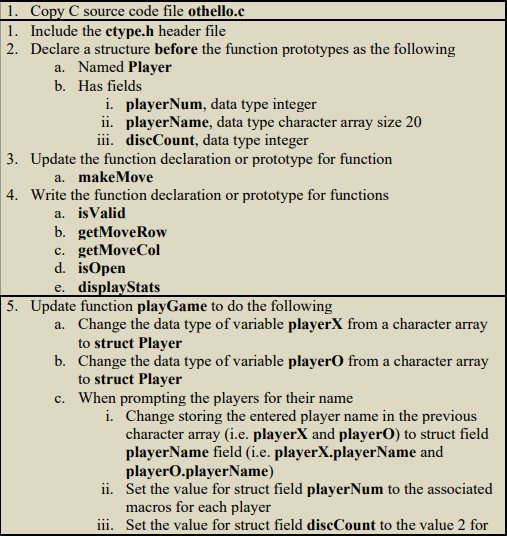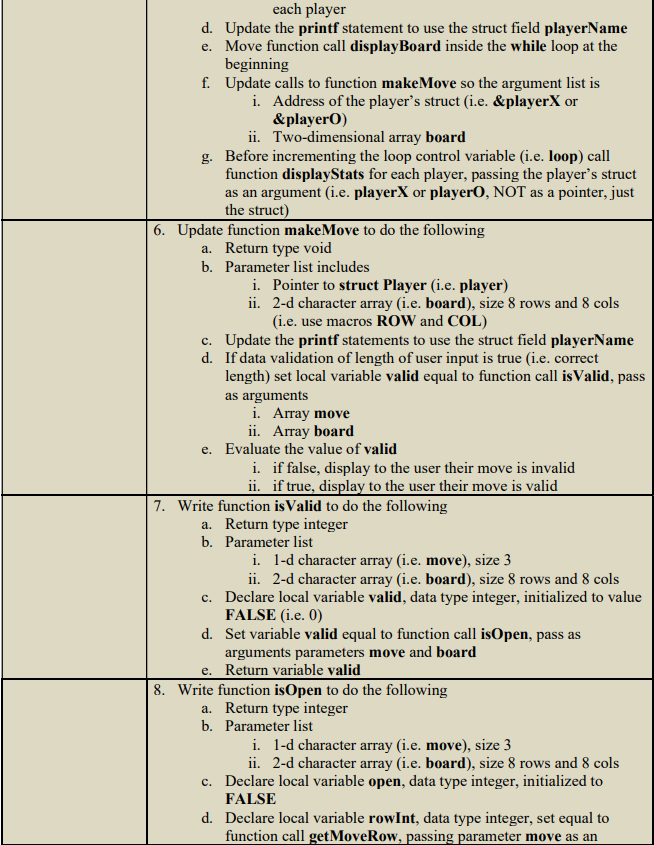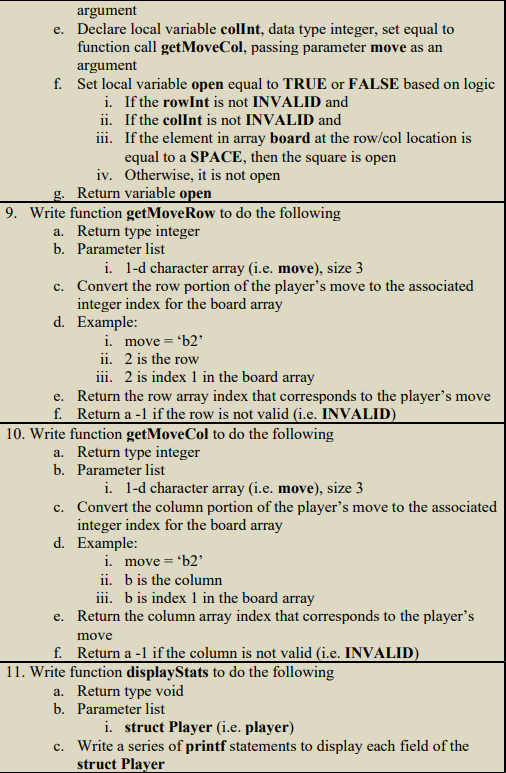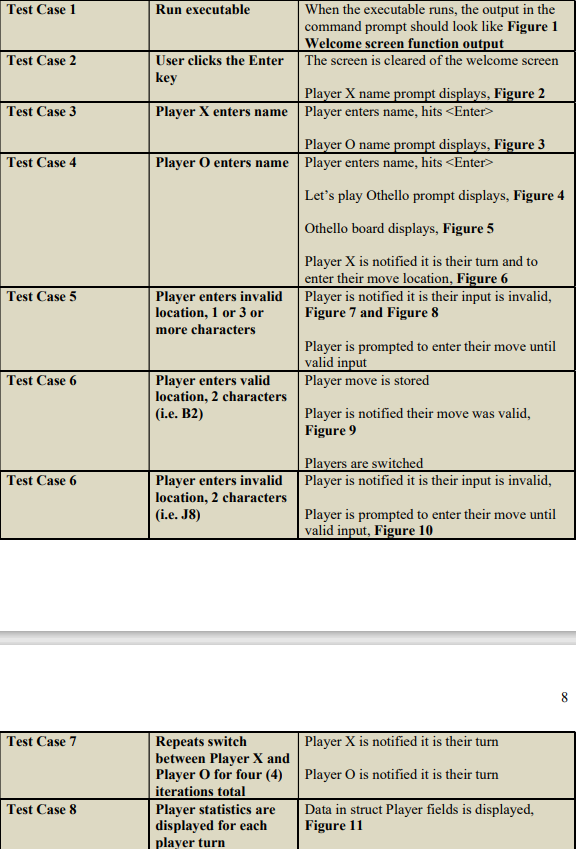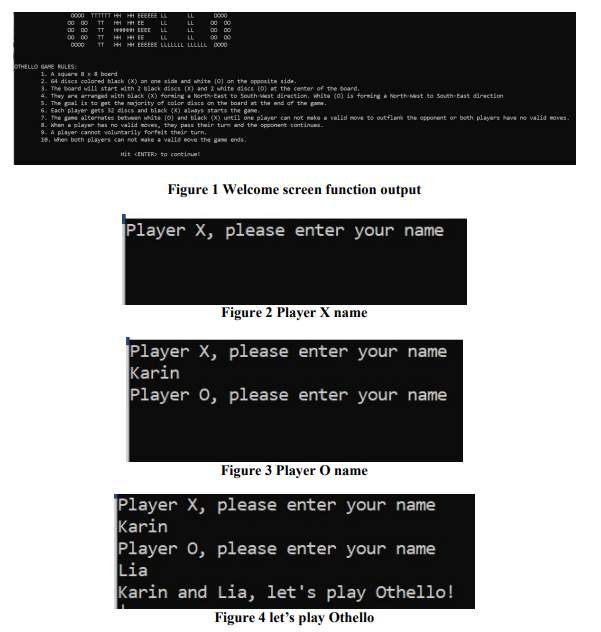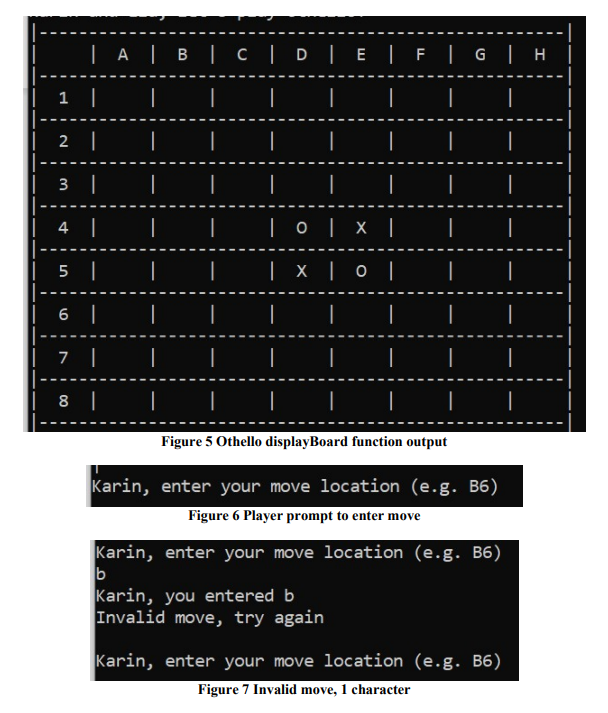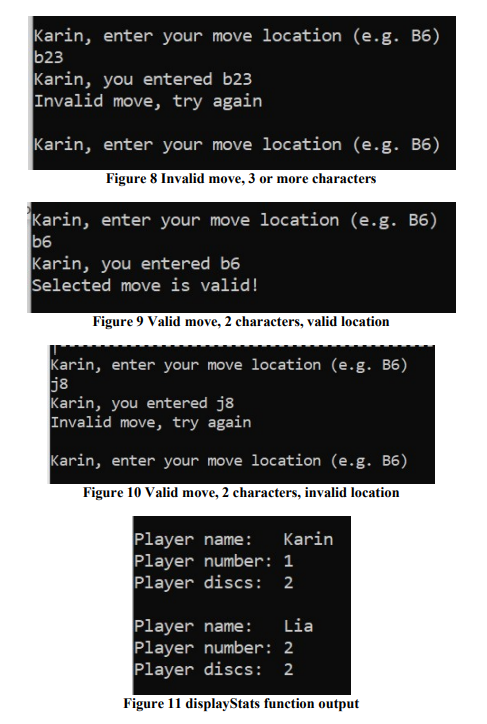[Solved] Declare a structure before the function prototypes as the following a. Named Player b. Has fields i. playerNum, data type integer
UPDATE THE CODE IN C PROGRAMMING USING THE INSTRUCTIONS I PROVIDED PLEASE!
#include <stdio.h>
#include <stdlib.h>
#include <string.h>
#define TRUE 1
#define FALSE 0
#define NAME 20
#define ROW 8
#define COL 8
#define SPACE ‘ ‘
#define PLAYER_X 1
#define PLAYER_O 2
#define ZERO 0
#define ONE 1
#define TWO 2
#define THREE 3
#define FOUR 4
#define INVALID -1
// function prototypes
void welcomeScreen ();
void displayExplicitBoard();
void clearScreen();
void playGame();
void initializeBoard(char board[ROW][COL]);
void displayBoard(char board[ROW][COL]);
void makeMove(char playerName[NAME], int playerNum, char board[ROW][COL]);
// main function
int main()
{
// call function welcomeScreen
welcomeScreen();
// call function clearScreen
clearScreen();
// call function displayExplicitBoard
// displayExplicitBoard();
// call function playGame
playGame();
// program executed successfully
return 0;
}
// welcomeScreen function displays the Othello logo and rules of the game
void welcomeScreen ()
{
printf (“\t\t OOOO TTTTTT HH HH EEEEEE LL LL OOOO \n”);
printf (“\t\tOO OO TT HH HH EE LL LL OO OO \n”);
printf (“\t\tOO OO TT HHHHHH EEEE LL LL OO OO \n”);
printf (“\t\tOO OO TT HH HH EE LL LL OO OO \n”);
printf (“\t\t OOOO TT HH HH EEEEEE LLLLLLL LLLLLL OOOO \n”);
printf (“\n\n”);//
printf (“OTHELLO GAME RULES:\n”);
printf(“\t1. A square 8 x 8 board\n”);
printf(“\t2. 64 discs colored black (X) on one side and white (O) on the opposite side.\n”);
printf(“\t3. The board will start with 2 black discs (X) and 2 white discs (O) at the center of the board.\n”);
printf(“\t4. They are arranged with black (X) forming a North-East to South-West direction. White (O) is forming a North-West to South-East direction\n”);
printf(“\t5. The goal is to get the majority of color discs on the board at the end of the game.\n”);
printf(“\t6. Each player gets 32 discs and black (X) always starts the game.\n”);
printf(“\t7. The game alternates between white (O) and black (X) until one player can not make a valid move to outflank the opponent or both players have no valid moves.\n”);
printf(“\t8. When a player has no valid moves, they pass their turn and the opponent continues.\n”);
printf(“\t9. A player cannot voluntarily forfeit their turn.\n”);
printf(“\t10. When both players can not make a valid move the game ends.\n”);
}
// function displayExplicitBoard displays a hardcoded version of an Othello board
void displayExplicitBoard()
{
printf(“|—————————————————–|\n”);
printf(“| | A | B | C | D | E | F | G | H |\n”);
printf(“|—————————————————–|\n”);
printf(“| 1 | | | | | | | | |\n”);
printf(“|—————————————————–|\n”);
printf(“| 2 | | | | | | | | |\n”);
printf(“|—————————————————–|\n”);
printf(“| 3 | | | | | | | | |\n”);
printf(“|—————————————————–|\n”);
printf(“| 4 | | | | O | X | | | |\n”);
printf(“|—————————————————–|\n”);
printf(“| 5 | | | | X | O | | | |\n”);
printf(“|—————————————————–|\n”);
printf(“| 6 | | | | | | | | |\n”);
printf(“|—————————————————–|\n”);
printf(“| 7 | | | | | | | | |\n”);
printf(“|—————————————————–|\n”);
printf(“| 8 | | | | | | | | |\n”);
printf(“|—————————————————–|\n”);
}
// function clearScreen clears the screen for display purposes
void clearScreen()
{
printf(“\n\t\t\t\tHit <ENTER> to continue!\n”);
char enter;
scanf(“%c”, &enter );
// send the clear screen command Windows
system(“cls”);
// send the clear screen command for UNIX flavor operating systems
// system(“clear”);
}
void playGame()
{
// get player names
char playerX[NAME];
char playerO[NAME];
// Othello board
char board[ROW][COL]; // this is really a memory location of board[0][0]
// black (X) always goes first
int currentPlayer = PLAYER_X;
int loop = ZERO;
printf(“Player X, please enter your name\n”);
scanf(“%s”, playerX);
printf(“Player O, please enter your name\n”);
scanf(“%s”, playerO);
printf(“%s and %s, let’s play Othello!\n”, playerX, playerO);
// call function initializeBoard
initializeBoard(board);
// call function displayBoard
displayBoard(board);
while(loop < FOUR)
{
// request the player’s move
if(currentPlayer == PLAYER_X)
{
makeMove(playerX, currentPlayer, board);
currentPlayer = PLAYER_O;
}
else if(currentPlayer == PLAYER_O)
{
makeMove(playerO, currentPlayer, board);
currentPlayer = PLAYER_X;
}
loop++;
}
}
void initializeBoard(char board[ROW][COL])
{
for(int row = 0; row < ROW; row++)
{
for(int col = 0; col < COL; col++)
{
if((row == THREE && col == THREE) || (row == FOUR && col == FOUR))
board[row][col] = ‘O’;
else if((row == THREE && col == FOUR) || row == FOUR && col == THREE)
board[row][col] = ‘X’;
else
board[row][col] = SPACE;
}
}
}
void displayBoard(char board[ROW][COL])
{
printf(“|—————————————————–|\n”);
printf(“| | A | B | C | D | E | F | G | H |\n”);
for(int row = 0; row < ROW; row++)
{
printf(“|—————————————————–|\n”);
printf(“| %d |”, (row + 1));
for(int col = 0; col < COL; col++)
{
printf(” %c |”, board[row][col]);
}
printf(“\n”);
}
printf(“|—————————————————–|\n”);
}
void makeMove(char playerName[NAME], int playerNum, char board[ROW][COL])
{
char move[THREE];
int valid = FALSE;
// loop until the player enters a valid move
while(valid == FALSE)
{
printf(“%s, enter your move location (e.g. B6)\n”, playerName);
scanf(“%s”, move);
printf(“%s, you entered %s\n”, playerName, move);
// clears the buffer of extra characters
getchar();
// fflush(stdin);
int length = (int)strlen(move);
if(length == TWO)
valid = TRUE;
else
valid = FALSE;
if(valid == FALSE)
printf(“Invalid move, try again\n\n”);
}
}
Expert Answer
The answer provided below has been developed in a clear step by step manner.Step: 1
void playgame() {
char playerX[20]=NAME;char
playerO[20]=NAME; int current player=1;
int loop=zero
printf(“Hi playerX…..
OR

